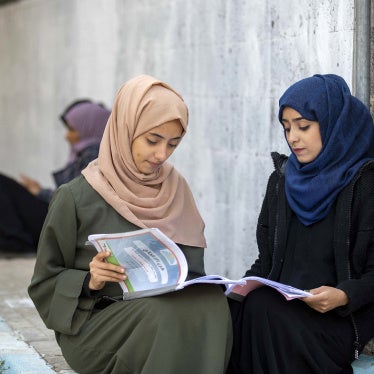Dr. Salim Abdullah al-Jabouri
The Speaker of the House
House of Representatives, Parliament
Baghdad, Iraq
Re: Draft Law on Anti-Domestic Violence Before Parliament
Dear Dr. Salim Abdullah al-Jabouri,
We write concerning the 2015 draft Law on Anti-Domestic Violence and its amendments in 2016 which are currently before the House of Representatives for review. We urge you to strengthen the bill to better prevent domestic violence, protect survivors, and hold abusers accountable.
Iraqi legislators’ effort to address domestic violence by drafting this bill is a positive step forward. The bill includes many positive provisions including services for domestic violence survivors, protection orders and penalties for their breach, and the establishment of a cross-ministerial committee to combat domestic violence. However, there are still several gaps in the bill which could undermine its effectiveness in combatting domestic violence. Human Rights Watch has outlined some of these concerns as well as recommendations on how the bill could be strengthened in the attached memorandum.
Our commentary on the proposed law is based on international human rights standards, and our experience in investigating the state response to domestic violence around the world for more than twenty years. We have collaborated with governments, international agencies, and civil society groups to promote strong domestic violence laws and programs.
Our concerns include, among others, that the draft law fails to adequately define domestic violence or set out penalties for the crime of domestic violence. The bill also prioritizes “family reconciliation” over protection and justice for survivors. UN guidance provides that mediation should not feature in any legal proceedings on violence against women.
The draft law also fails to set out concrete duties of the police in responding to domestic violence and the different types of evidence that could be considered in domestic violence cases. While the bill includes protection orders for survivors, it does not distinguish between, and provide for, emergency (short-term) orders and longer-term orders, including that short-term orders can be issued ex parte (without all parties present) on the basis of a victim’s testimony, whereas a longer-term order would allow for a full hearing and review of evidence.
While the bill provides for the establishment of shelters, it should require coordination with local women’s rights organizations on the administration, training, and running of such shelters. The bill should further provide for other services for survivors including a 24-hour hotline for assistance, access to healthcare, and legal assistance. The bill should also clarify that prevention measures should include awareness-raising activities, development of educational curricula on violence against women, and sensitizing the media regarding domestic violence.
There is a growing trend to combat domestic violence through legislation in the Middle East and North Africa. Several countries and autonomous regions in the Middle East and North Africa region have introduced some form of domestic violence legislation or regulation, including Algeria, Bahrain, the Kurdistan Region of Iraq, Israel, Jordan, Lebanon, and Saudi Arabia. These laws vary in the degree to which they comply with international standards. Several other countries, including Morocco and Tunisia, are considering draft legislation on domestic violence. Beyond the Middle East and North Africa, most Muslim-majority countries or autonomous regions have also adopted domestic violence or violence against women legislation including Afghanistan, Azerbaijan, Bangladesh, Bosnia and Herzegovina, Indonesia, Kazakhstan, Kosovo, Kyrgyzstan, Gambia, Malaysia, Maldives, Nigeria, the Punjab province of Pakistan, Sierra Leone, Tajikistan, and Turkey. Iraq should ensure that its legislation on domestic violence is comprehensive and in line with international standards.
Thank you for your time and attention to this letter. We hope that our comments are useful in your deliberations, and that we can work together to promote women’s safety and rights. Please contact my colleague Rothna Begum at at xxxxxxxxxxxxxx or at +1-xxx-xxx-xxxx if you would like to discuss any of the points further.
Sincerely,
Janet Walsh
Acting Director
Women’s Rights Division
cc: The Legal Committee in the House of Representatives
The Women, Family and Child Committee in the House of Representatives








